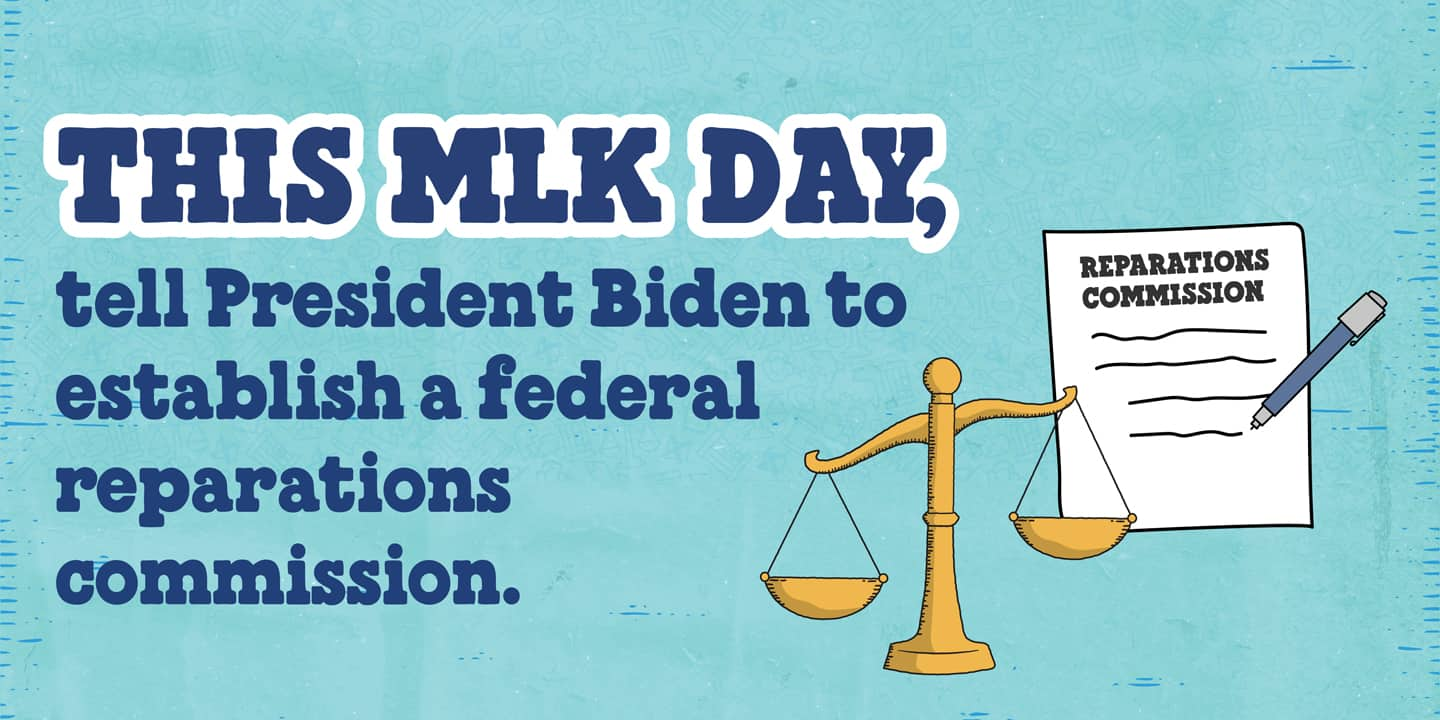January 13, 2023

When the architects of our republic wrote the magnificent words of the Constitution and the Declaration of Independence, they were signing a promissory note… It is obvious today that America has defaulted on this promissory note insofar as her citizens of color are concerned.
—Dr. Martin Luther King, Jr., “I Have a Dream” speech, 1963
This MLK Day, tell President Biden to use his executive authority to establish a federal reparations commission.
To truly honor Dr. Martin Luther King, Jr., and build a more just future, we must openly and honestly reckon with the legacy of slavery and the ongoing impact of racism in this country.
That’s where a federal reparations commission can make a big difference.
What Would a Federal Reparations Commission Do?
The idea of a federal reparations commission comes from H.R. 40, legislation in the House of Representatives that would create a commission to study the impact of slavery, discrimination, and systemic racism from 1619 to the present day, with the goal of recommending appropriate remedies or reparations.
H.R. 40 has been introduced in every session of Congress for about three decades with very little action taken, but the debate over reparations was reinvigorated in recent years, leading to a feeling that the bill’s chances of success were finally looking up. After the midterm elections, though, passage in the House of Representatives is no longer on the table.
That’s why President Biden must use his executive authority to create a federal reparations commission—today. Only by openly exploring and seeking to understand our true history, can we hope to begin working together for equity and justice.
What Are Reparations?
Reparations can be many things. Throughout history, they have often taken the form of payments or programs meant to help those who have been victimized by a great injustice—like, for example, the internment of Japanese Americans during the Second World War. Reparations programs have been implemented successfully in the US and around the world.
Economists have studied the American system of slavery and come up with estimates (in today’s money) of its financial impact on the country AND on enslaved people.
- Slavery contributed about $42 trillion to the wealth of white slaveholders
- Enslaved people lost out on about $23 trillion for their labor
After the Civil War, attacks on Black wealth continued. The Tulsa Race Massacre (an attack by white mobs on Black institutions and businesses in a community known at the time as Black Wall Street that left property destroyed and 300 dead) alone resulted in a loss of $200 million, and that was only one of more than 100 similar attacks over the post-war period.
Reparations must include an acknowledgement of that debt. They must acknowledge the immense harm that slavery, lynchings, structural racism, and white supremacy have done to Black and Brown people.
I believe we ought to do all we can and seek to lift ourselves by our own bootstraps. But it’s a cruel jest to say to a bootless man that he ought to lift himself by his own bootstraps, and many Negroes by the thousands and millions have been left bootless as a result of all these years of oppression.
—MLK, 1967 interview
Why Are We Talking About Reparations?
Because 400 years of racism—and racist economic and social policies from the federal to the local level—continues to have a huge impact on Black and Brown people.
The racial wealth gap has persisted for generations. Why? Because structural racism, and the policies that reflect and result from it, reduces Black people’s quality of life, not to mention their opportunities for building and sustaining wealth. Believe it or not, right now the richest 400 Americans have more wealth than all Black households combined.
- Black households have only about 1/10 of the wealth of white households
- The unemployment rate for Black workers is 5.8%, compared to 3.5% for US workers overall
- Only 44% of Black families own their home, compared to 72% of white families
- Black people are 2X as likely as the general population to be denied a mortgage
Reparations Now!
If you’re interested in learning more about H.R. 40, reparations, and the legacy of slavery in the US, we recommend watching The Big Payback on PBS. It’s an incredibly powerful story.
What’s clear is that facing the hard truths about our history is the only way to advance social justice and honor Dr. King’s lifelong fight for racial equity. We must work together to create a more just and equitable society.
Join us in calling on President Biden to use his executive authority to create a federal reparations commission NOW.


